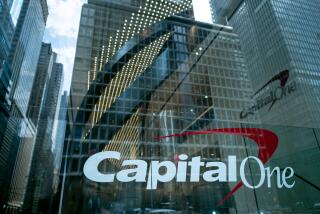Lender CIT to buy OneWest Bank, formerly IndyMac, for $3.4 billion
OneWest Bank in Pasadena, born from the ashes of failed high-risk home lender IndyMac Bank, has agreed to be acquired by commercial lender CIT Group for $3.4 billion, a hugely profitable deal for the hedge-fund and private-equity investors that have owned the bank for five years.
CIT, a 100-year-old specialist in loans and leases for smaller businesses, is based in New York, but its commercial bank subsidiary would merge into OneWest if the takeover -- the latest in a series of mergers reshaping Southern California’s banking industry-- is completed as expected in six months to a year.
The combined institution, doing business as CIT Bank, would be run by OneWest’s current management from Pasadena.
That would create the largest bank based in Southern California as measured by assets -- $67 billion compared with $30 billion at L.A.’s City National Corp. and $28 billion at East West Bancorp in Pasadena.
“I live in L.A. and like it here. We’re not going anywhere,” said Steven Mnuchin, whose Dune Capital Management led the investor group that acquired IndyMac from the Federal Deposit Insurance Corp. in 2009.
Mnuchin said CIT’s acquisition of OneWest for $2 billion in cash and CIT stock worth $1.4 billion, at Monday’s closing price, would leave him as chairman of the bank. He would become vice chairman and a board member at CIT Group.
Joseph Otting, OneWest’s president and chief executive, would continue in those roles at the merged bank.
Otting said the deal would expand the lending options that OneWest provides to businesses, while providing CIT billions of dollars of bank branch deposits, a more reliable source of funding than the deposits CIT has gathered through brokers and over the Internet.
OneWest has 73 retail branches in Southern California and $15 billion in deposits. Its $23 billion in assets include a large portfolio of jumbo home loans and smaller but sizable numbers of commercial mortgages, loans to apartment owners and commercial and industrial loans.
Its predecessor, IndyMac, a spinoff from Countrywide Home Loans, had focused on making mortgages with little or no documentation of income or assets -- often just a statement of income that during the housing boom was called liar loans.
IndyMac’s collapse in July 2008 was an early warning of what was to come in the rest of the banking industry, and the costliest ever to federal bank deposit insurance funds, at $13 billion. A run on the bank triggered its takeover by the FDIC, with depositors lined up outside branches demanding their money back.
The group headed by Mnuchin outbid other potential buyers in an FDIC auction, putting up $1.55 billion in 2009 to revitalize the bank. Other investors included bank buyout expert J. Christopher Flowers, computer mogul Michael S. Dell and hedge fund operators George Soros and John Paulson.
In the five years since then, regulatory filings showed the bank turned more than $3 billion in profits, enabling the investors to pull out nearly $1.86 billion in dividend payments by the end of 2013.
Follow @ScottReckard for news of bank deals and mortgage lending







